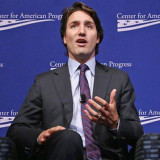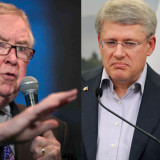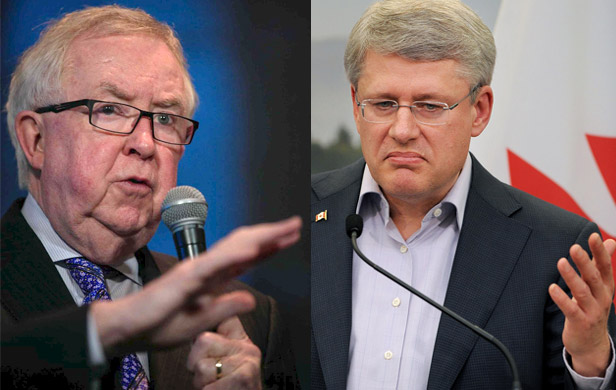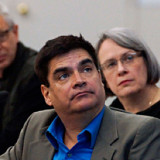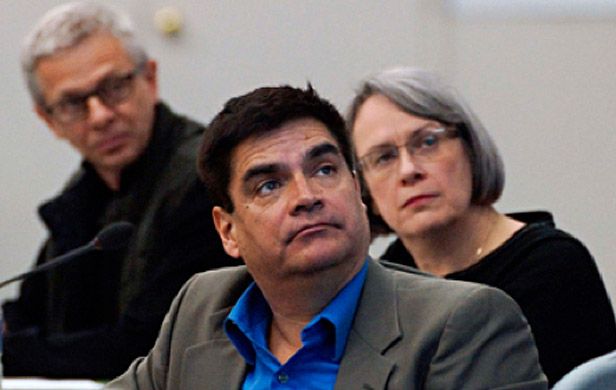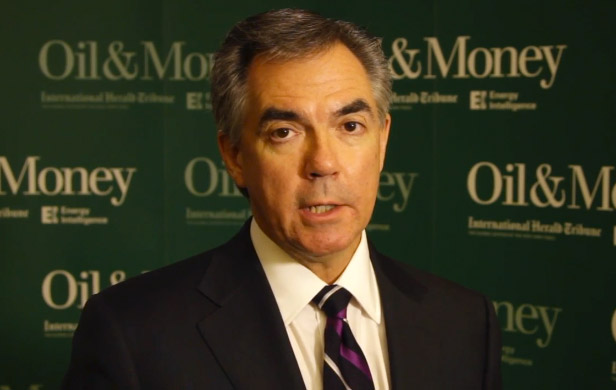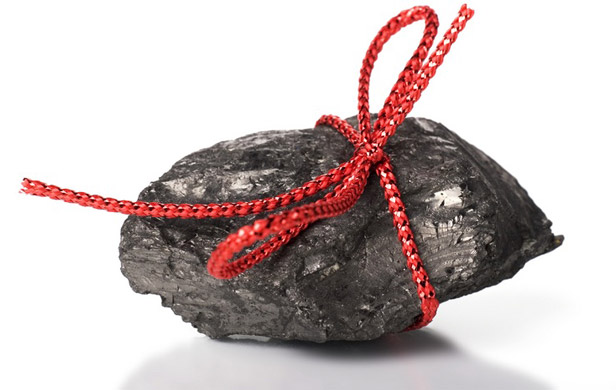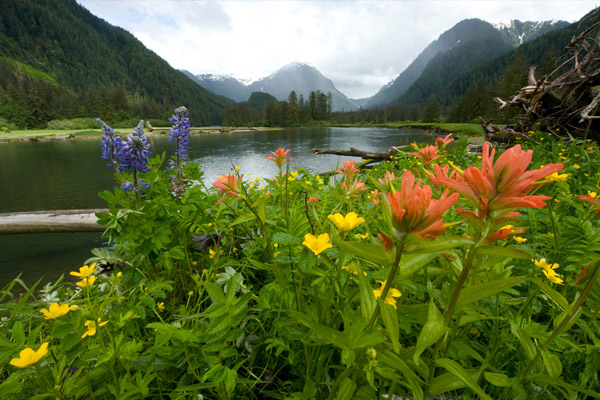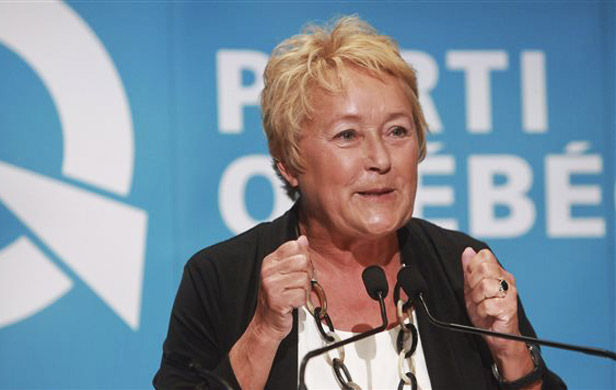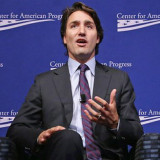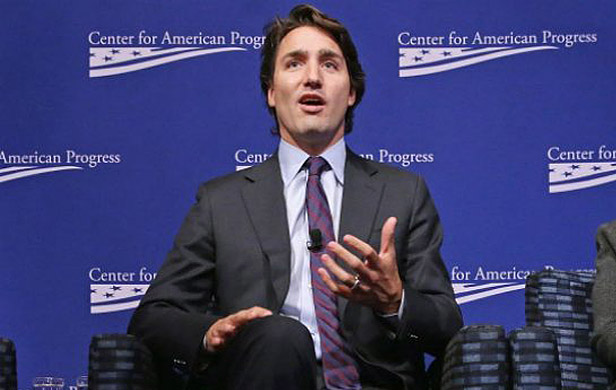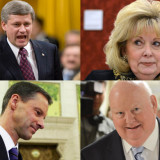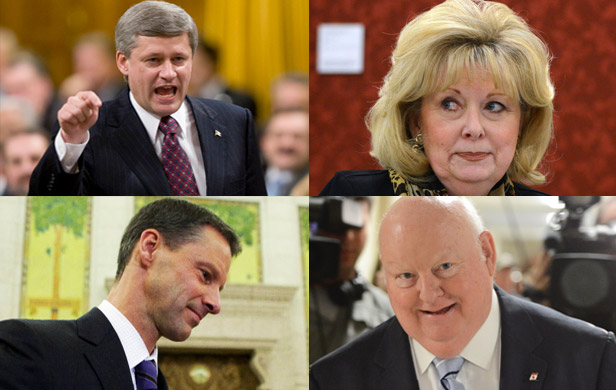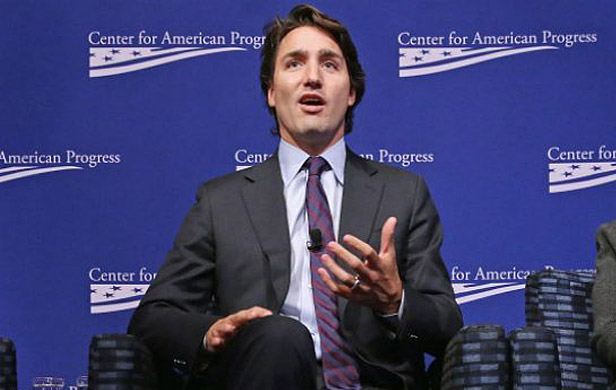
Justin Trudeau wants to project a young, fresh face, representing all the good things that Canadians want – a man who would do politics differently. But the gap between reality and fairytale is extraordinary.
If one looks at what he has said to date, one finds a man with tired old ideas; a limited understanding of, and sensitivity for, many major issues; and a puppet serving Bay Street, Big Oil and other powerful interests. The same powerful interests served by the Harper administration.
A middle class fairy tale
Most telling is Trudeau’s supposed concern for the middle class. Though 80% of Canadians have seen their revenues decline or stagnate over the last 3 decades – income inequalities are at an all time extreme – Trudeau, like Stephen Harper, has concluded that low corporate taxes are the way to go for maintaining what they perceive to be a prosperous and rich Canada.
But Trudeau goes one step further to the right than Harper. He has repeatedly expressed the view that now is not the time to lower the corporate tax rate, implying that, at a later time, a lower corporate tax rate could be an option.
To put all this in context, the lowering of corporate tax began with the Liberals and was accelerated by the Conservatives. The result is that: 1) At 15%, Canada has the lowest corporate tax rate in the G8; and 2) approximately $575B lies dormant in corporate liquidity.
Together, these factors imply that having the lowest corporate tax offers very few competitive advantages and that a better distribution of the wealth could be achieved with higher corporate taxes and fewer fiscal escape clauses/deductions. The additional accrued revenues could be invested in economic development and regional diversification; youth employment; health; innovation for the jobs of tomorrow; public transportation and other urban infrastructure; day care – to name just a few examples.
Further on this theme, Kevin Page, the former Parliamentary Budget Officer, concluded that a low corporate tax rate limits government manoeuvrability to that of austerity budgets.
In his own clumsy fashion, Trudeau has confirmed Kevin Page’s analysis in that he recognizes that the Liberal Party of Canada’s (LPC’s) own Harper-like policies on wealth distribution would produce Harper-like results. To be more specific, to prepare Canadians for such an eventuality, or the “necessity” of this Bay Street accommodation, Trudeau has indicated that the post election LPC budget could very well be an austerity budget.
In other words, there is a disconnect between Trudeau’s supposed concern about the middle class and reality. In the absence of any serious attempt at redistribution of the wealth – something in which Trudeau appears not to believe in – he can only offer a middle class fairy tale. This is a backdrop for many Trudeau’s positions on other issues.
No wonder Justin has described income splitting as “a decent idea”, even though 85% of Canadians would receive no benefit, while the majority of the top 1% of income earners would get $6500 and up. So much for his preoccupation with the middle class.
Appeasing Big Oil, denying science
Turning to the environment, once again Trudeau has much more in common with Harper than most think, particularly when it comes to the denial of scientific evidence. It’s high time to debunk the myths about Trudeau’s “concerns” in this domain.
Trudeau’s position on Keystone XL is case in point. According to Justin, the opposition to Keystone XL to transport tar sands bitumen to the US Golf coast is not based on scientific evidence. Yet life-cycle emissions related to tar sands – from the extraction stage to the refining and production of major quantities of the by-product pet coke for use as a cheap, dirty fuel; and to the final consumption as fuels – place tar sands-derived substances in the range of 20% to 25% more emissions than those associated with conventional petroleum.
As if this extreme denial is not enough to put Trudeau in the same Big Oil camp as Harper, Trudeau has also complimented Premier Redford for promoting Keystone XL with references to Canada’s good environmental record! Trudeau has been critical of Harper for not doing the same – despite Harper’s disastrous environmental legacy.
This is absolutely astounding! After Harper’s dismantling of environmental protection legislation, weakening of the environmental impact analysis process, muzzling scientists, decimation of Canada’s environmental research capabilities especially as it relates to the impacts of climate change and the monitoring of Canada’s emissions, pulling out of the Kyoto Protocol, and much much more, Trudeau, like Harper, perceives the environment as a PR challenge rather than a Mother Earth/humanity state of health challenge.
But the denial doesn’t stop there. Trudeau bases part of his support for Keystone XL, as is the case with Stephen Harper, on the recent US Dept of State report which suggests that the environmental impacts pertaining to the approval of Keystone XL will be minimal.
Never mind that this report was written by authors close to the petroleum industry who concluded that if the US cannot import unrefined tar sands derivatives, the US would get it’s petroleum from elsewhere.
Never mind that a rejection of Keystone XL would be a US and global game-changer, sending a clear signal to the globe that the US is serious about reducing its dependency on fossil fuels and will be looking to clean tech to address tomorrow’s energy needs.
Indeed, under these circumstances, it should come as no surprise that Trudeau did not distant himself from Jean Chrétien’s January 2014 remarks to the effect that it makes no sense to restrict tar sands development because we are going to need petroleum for a long time to come.
Falling behind Europe on emissions reduction, green economy
And the denial goes a notch higher when it comes to Trudeau’s views on national solutions to address climate change. In keeping with the Liberals’ conciliatory legacy with Big Oil, this time, in reference to cap and trade, he claims that this environmental concept doesn’t have scientific merit. (Cap and trade is a model which penalizes companies that exceed their emissions limits and rewards companies that reduce emissions below their targets by being able to sell their credits to firms in the proceeding category.)
Never mind that Europe has had an Emission Trading Scheme (ETS) since 2005 and that the ETS has proven to be a potent compliment to other environmental policies. The results are such that at least 25 EU nations have been identified as likely to meet or beat the EU target 20% reduction of emissions by 2020, relative to 1990 levels.
Never mind that Germany has exceeded it’s Kyoto Protocol goal of a 21% reduction in emissions by 2012 with an achievement of a 25% reduction, all while having one the world’s strongest economies and a clean tech sector that has become bigger than the German auto sector.
Never mind that China has become the world’s largest investor in clean tech – with $67.7B and $61.3B invested in renewables in 2012 and 2013, respectively – and is now planning to introduce the first of seven pilot cap and trade schemes in Shenzhen.
As a former Government of Canada employee who worked in the field of sustainable development, it comes as no surprise that Trudeau’s “thinking” on Big Oil is both conciliatory and wishy-washy. Emissions spiked up during the previous Liberal reign – as has been the case with the Conservatives at the helm.
The Liberals’ oil-friendly legacy
This LPC legacy was so because of, among other things: 1) the absence of effective legislative and fiscal measures; 2) the party’s continuation of generous subsidies for the fossil fuel sectors; and 3) a fossil fuel-friendly mindset as reflected in the Stéphane Dion proposal, prior to the Liberals’ defeat, to invest billions of government funds in the fossil fuel industry to help that “impoverished” sector reduce its emissions.
It is becoming increasingly evident that Trudeau is vague as to his environmental plans because of his alignment with Big Oil, a longstanding Liberal tradition.
By contrast, Thomas Mulcair advocates a transfer of subsidies from the fossil fuel sectors to the clean tech.
Poor judgement, top-down leadership and Harper similarities
Further on the denial of science, but in a different context, is the matter of the unusually long time – over a year – that it is taking for Health Canada to approve for use in Canada the drug Mifepristone (a.k.a. RU-486), the abortion drug. This, despite the fact that the drug has been in use around the world since 1988, when it was first approved in France.
Given the views on abortion of the minister in question, Rona Ambrose, the delays are suspect. But all Justin Trudeau could say on the exceptional delays is that he is not a medical expert. Imagine the implications of him being in power with his weak judgement, when this is combined with his not wanting to upset Big Pharma and right wing groups.
Equally telling on Trudeau’s poor judgement and flippancy, was his “performance” on the Radio-Canada TV show Tout-le-monde-en-parle, on Feb 23, 2014. The Ukrainian Ambassador to Canada, Vadym Prystaiko, quite aptly called for Trudeau to apologize for his “joke” on the show to the effect that Vladimir Putin would not be in a good mood to discuss the Ukrainian turn of events because of the defeat of the Russian men’s hockey team in Sochi. As the Ambassador said, 82 deaths in the clashes between security forces and the demonstrators is no laughing matter.
Trudeau’s lightweight Senate proposal
As for the Senate, I have saved this for near the end because I think we should go beyond the scandals of the moment, to the stuff that has implications for all Canadians. Let’s get real. The case has yet to be made as to why a different Senate, made up of unelected officials and appointed by another group of unelected officials, would improve Canadian democracy. More important, with Senate retirements not mandatory until age 75, it means it would take at least two decades before this so-called different Senate would take shape.
Add to the Trudeau Senate cocktail the way in which he went about springing the news on “Independent” former Liberal Senators. Here one discovers Harper-style, top-down leadership, with no consultations outside a small inner circle. Due to the absence of internal consultation, Trudeau not only surprised Liberal Senators, but his entire caucus! Or is this another case of poor and gratuitous judgement?
Justin opposes divisive politics – except when it suits him
While Justin Trudeau presents himself as a uniter, not a divider like Harper and Quebec Premier Pauline Marois, delegates at the Feb 2014 national convention in Montreal expressed the view that a Marois majority would help the party gain votes in BC and Ontario. In other words, the LPC hopes for a PQ majority in order to falsely represent the LPC in English Canada as the saviour of national unity. This is wedge politics that places party interests above national interests in order to target specific regional voters. This is the kind of traditional LPC trick that turns off Québécois.
No wonder only 10% of the LPC delegates at their convention in Montreal, Quebec were from Quebec.
During the orange wave in Quebec, the NDP gains were in part the result of former Bloc voters shifting over to the federalist NDP. This is the way to unite Canadians, by presenting a progressive alternative for all parts of Canada – with the same themes/messages in every region of the country.
Trudeau and Harper: Other similarities
Finally, there are a host of other matters where we find Trudeau and Harper very much on the same page – such as Trudeau’s views that: 1) the sale of Nexen would pave the way for free trade with China and a more prosperous middle class; 2) health is primarily a management issue, rather than a financial challenge; and 3) guns are an integral part of Canadian culture.
Summing up the LPC policy positions to-date, it is clear is that Stephen Harper and Justin Trudeau are on the same Bay Street/Wall Street, Big Oil team.
Why would we expect anything different from Justin in 2015?
